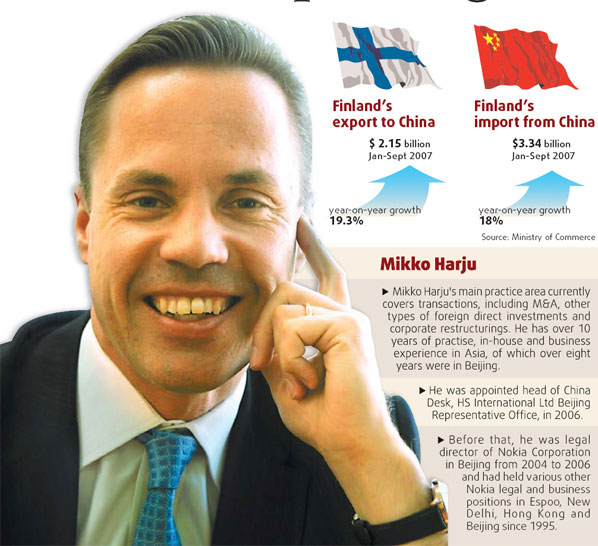Even though there's room for more business, China already provides many opportunities for Finnish companies in several sectors including energy saving, environmental protection, paper and pulp, and IT and telecom, Finnish Business Council in Beijing (FBCB) chairman Mikko Harju told China Daily.
"There seems to be a constant flow of new companies either setting up shops in China or seeking export and import opportunities with Chinese counterparts," he said.
After years of cooperation, the two countries have made great progress in their trade ties. The business environment and information availability have improved greatly as well, especially after China's accession to the World Trade Organization (WTO) in 2001, said Harju.
Finnish companies here have witnessed first hand China's phenomenal growth, especially in the investment sector. New laws and regulations have increased transparency in business dealings. And, significant investments in infrastructure, including public transportation services, have improved companies' efficiency and competitiveness.
With the volume of data traffic exploding, FBCB expects further improvements in IT infrastructure in terms of both capacity and reliability. It also expects better and more cost-efficient export cargo services for smaller volumes.
Harju expected active promotion of tri-party collaboration among China, Russia and Finland, which will mean improved railway cargo services from northern China to northeastern Europe can be put to good use.
Finnish companies are traditionally strong in technical capabilities, research and development, product quality, and innovation. With better marketing and understanding of the Chinese market, customers and consumers, they should be in a strong competitive position in China, Harju said.
As China attaches more importance to economic development, especially in the energy, transportation, telecommunications, environmental protection, healthcare, and hi-tech research and development sectors, Finnish companies are likely to find a lot of opportunities in the country.
On the Finnish domestic market, Harju said although it is limited in size, its consistent international ranking as one of the best business environments makes it a very interesting market for foreign investors.
He added that the Finnish market is considered transparent, with a highly skilled labor force, and features a number of companies with state-of-the-art products and technologies, which would interest Chinese manufacturers and investors.
FBCB is an informal group of enterprises either originating in Finland or interested in doing business with Finnish companies. Founded in 1990, it has sister organizations in both Shanghai and Guangzhou. FBCB has around 50 members.
Acting as an information platform, FBCB provides its members information on topical issues related to trade and industry in China and promotes collaboration and cooperation between its members here.
FBCB organizes various events on topical business, legal and environmental matters to share information and best practices between its member companies in order to help Finnish companies in China.

(China Daily, February 26, 2008)